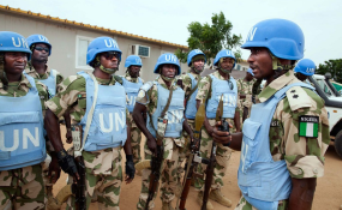U.N. Secretary-General Antonio Guterres is urging the international community to step up its commitment to the organization’s peacekeeping operations, particularly in improving its specialized equipment and troop needs.
“As conflicts become more complex and high-risk, our operations must keep pace,” Guterres on Friday told more than 100 defense ministers, foreign ministers and diplomats.
The U.N. chief appealed for critical capabilities, including armored personnel carriers to protect peacekeepers in Mali and medical evacuation helicopters for its mission in the Central African Republic.
“Elsewhere, we need armed utility helicopters; intelligence, surveillance and reconnaissance units; quick reaction forces, and air medical evacuation teams,” Guterres said. “I urge you to consider contributing these high-value and critical capabilities, and I assure you that they will be utilized effectively and efficiently, in accordance with our command-and-control policy.”
U.N. troops and police have had to adjust to asymmetrical threats, including from armed groups and terrorists. Last year, 27 peacekeepers were killed in the line of duty. New kinds of technology and equipment are needed to better prepare and protect them from these threats.
The world body has nearly 100,000 troops and police from 127 countries working in 14 missions in Haiti, Africa, the Middle East and South Asia. The peacekeeping department has a budget of nearly $7 billion a year.
As the U.N. looks to achieve gender parity throughout the organization, the secretary-general noted that it is “unacceptable” that only 4 percent of peacekeepers are women. He said his staff will present a strategy to increase their numbers to the Security Council next month.
“Beyond better equipment and readiness, we must increase local engagement,” Guterres said. “Women peacekeepers and civilian staff are essential to improve those efforts.”
“If we want to substantially increase the number of women in peacekeeping operations, we need to increase the numbers of women in our respective militaries,” Canada’s Defense Minister Harjit Sajjan pointed out to the assembly.
Ethiopia’s female defense minister said her country is both the leading troop contributing country with 8,000 troops in U.N. missions, and it has the most women (800) deployed.
“However, while it may be the highest number from a single country, it is still barely representative of the possibilities,” said Aisha Mohammed Mussa.
U.N. peacekeeping has also struggled with allegations against some of its blue helmets — as the peacekeepers are known — of raping or sexually exploiting the civilians they are sent to protect. After a “zero tolerance” campaign started under the previous secretary-general, the numbers of such cases are starting to come down. A report earlier this month said the number of cases in peacekeeping and political missions dropped to 54 in 2018 from 62 in 2017 and 104 in 2016.
Ministers also made new pledges of troops, equipment or other capacities at Friday’s meeting.
Nepal’s defense minister said his country is ready to double its peacekeeping presence to 10,000 blue helmets if the U.N. requests the additional personnel. Brazilian Defense Minister Fernando Azevedo e Silva said his government would deploy a jungle-experts warfare team to the U.N. mission in the Democratic Republic of the Congo. Mongolia’s minister said his country was adding a rapid deployment battalion to its existing peacekeeping contribution.
The United States, which is the top funder of U.N. peacekeeping, providing a quarter of its annual budget, said it is focused on the development of intelligence, surveillance and reconnaissance capabilities, which are critical to improving the effectiveness of U.N. peacekeeping operations.
By Margaret Besheer





























